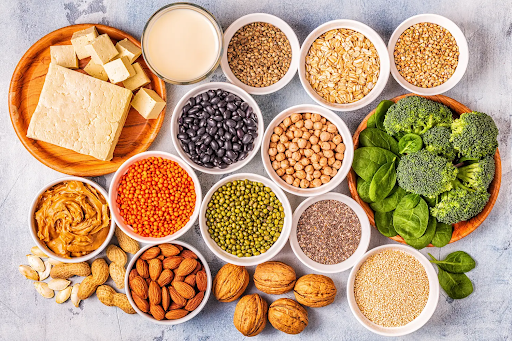How Gluten Free BBQ Sauce Elevates Your Vegan Grilling Game
How Gluten Free BBQ Sauce Elevates Your Vegan Grilling Game
Blog Article
All Regarding Healthy And Balanced Food: Benefits of Taking On Plant Based Alternatives
The conversation bordering plant-based diet regimens has gotten significant interest over the last few years. Numerous individuals are exploring the potential wellness advantages, dietary advantages, and environmental effects connected with these nutritional choices. As people come to be extra familiar with their food's impact on wellness and sustainability, questions occur about the practicalities of taking on such a way of life. What particular changes can one anticipate, and exactly how might these choices improve not just personal health yet likewise the planet's future?
Recognizing Plant-Based Diet Plans
Many individuals associate plant-based diet plans mainly with vegetarianism or veganism, these diet regimens can include a wide variety of consuming patterns that prioritize whole, minimally refined plant foods. Such diet regimens typically include fruits, veggies, entire grains, seeds, legumes, and nuts, while removing or limiting animal items. This adaptability allows people to customize their dietary choices according to individual choices and nutritional requirements. Some may embrace a primarily plant-based diet plan while still periodically consuming meat or dairy, commonly described as a flexitarian approach. The focus stays on integrating more plant foods, which can cause a diverse array of tastes and meals. Comprehending these different interpretations of plant-based eating is crucial for appreciating its availability and appeal in modern food culture.
Health Advantages of Plant-Based Foods
The health advantages of plant-based foods are significant, using a nutrient thickness advantage that sustains total health. Research suggests that these foods can improve heart health and wellness and play an important function in efficient weight administration. By incorporating extra plant-based options, individuals might boost their dietary options and promote long-lasting wellness.
Nutrient Thickness Benefit
Nutrient thickness plays a crucial function in the health and wellness benefits of plant-based foods, making them a compelling choice for those looking for a balanced diet plan. Plant-based foods, such as fruits, vegetables, beans, nuts, and entire grains, are usually abundant in crucial vitamins, minerals, and anti-oxidants while being reduced in calories. This high nutrient density allows people to eat fewer calories while still meeting their dietary demands. Furthermore, these foods are packed with nutritional fiber, advertising digestive system health and wellness and helping in weight management. By incorporating nutrient-dense plant-based choices, consumers can boost their general health, support their immune systems, and lower the danger of chronic illness. Eventually, the nutrient density of plant-based foods underscores their value in a health-conscious way of living.
Heart Wellness Improvement

Weight Management Support
Along with promoting heart health, a plant-based diet plan can considerably assist in weight administration. This nutritional method stresses whole foods such as fruits, veggies, legumes, nuts, and whole grains, which are generally lower in calories and greater in fiber compared to animal-based items. The high fiber material helps boost satiation, minimizing general calorie intake. Plant-based diets are commonly abundant in necessary nutrients while low in undesirable fats, making it less complicated to maintain a healthy weight. Study indicates that individuals who embrace a plant-based lifestyle tend to have reduced body mass indexes (BMIs) and experience even more effective weight reduction contrasted to those that eat meat-heavy diets. Embracing plant-based options is a tactical option for efficient weight monitoring.
Nutritional Value of Plant-Based Components
Plant-based ingredients are abundant in vital nutrients, offering a diverse selection of vitamins, minerals, and antioxidants that add to general health. A contrast of healthy protein resources discloses that while pet products are frequently deemed exceptional, several plant-based choices provide sufficient healthy protein and other valuable substances. Understanding the dietary value of these components can aid people make notified dietary selections.
Vital Nutrients in Plants
Nutrient-rich active ingredients located in plants offer a diverse selection of important nutrients that contribute greatly to general health and wellness. These ingredients are abundant in vitamins A, C, and K, which sustain immune feature, vision, and blood clot, specifically. On top of that, plants provide important minerals such as magnesium, potassium, and calcium, important for heart wellness, muscle mass feature, and bone toughness. The existence of fiber in plant-based foods help digestion and advertises a healthy intestine microbiome. Anti-oxidants, located perfectly in veggies and fruits, help battle oxidative stress and lower inflammation. Numerous plant foods are reduced in calories yet high in nutrients, making them an exceptional choice for those looking for to preserve a healthy and balanced weight while making sure excellent nutrient consumption.

Comparing Healthy Protein Sources
Healthy protein sources vary significantly in their dietary accounts, with plant-based components using distinct advantages. Unlike pet healthy proteins, which typically include saturated fats and cholesterol, plant healthy proteins have a tendency to be lower in these unhealthy parts. Legumes, nuts, seeds, and entire grains are abundant in crucial amino acids, fiber, vitamins, and minerals. Lentils offer high healthy protein have a peek here content alongside substantial iron and folate, while quinoa is a complete healthy protein, providing all nine crucial amino acids. Furthermore, plant-based proteins are commonly accompanied by antioxidants and phytochemicals that sustain general wellness. The shift to plant-based healthy protein sources not only boosts nutritional consumption but additionally aligns with lasting dietary methods, reducing environmental influence and promoting long-lasting health and wellness advantages.
Ecological Influence of Plant-Based Consuming
As understanding of climate change expands, numerous people are exploring sustainable nutritional options that can greatly lessen their environmental impact. Plant-based eating has arised as a considerable factor to reducing greenhouse gas emissions, which are largely connected with livestock manufacturing. The farming of fruits, beans, grains, and vegetables generally requires less sources, such as water and land, contrasted to pet farming. Additionally, plant-based diets can cause lowered logging, as much less land is required for grazing animals or expanding pet feed. By shifting towards plant-based options, consumers can support biodiversity and promote much healthier environments. Generally, welcoming plant-based consuming not just advantages individual health and wellness yet also represents an important step towards environmental sustainability and preservation initiatives.
Conquering Common Misconceptions
While several individuals identify the advantages of a plant-based diet regimen, numerous misconceptions frequently discourage them from completely embracing this lifestyle. A common idea is that plant-based diets do not have adequate protein; nonetheless, countless plant resources, such as vegetables, nuts, and tofu, offer ample healthy protein. Additionally, some think that this diet is expensive, when in fact, staples like beans, rice, and seasonal veggies can be rather affordable. Another misunderstanding is that plant-based consuming is extremely restrictive, whereas it actually uses a varied range of foods and flavors. Lastly, several stress that a plant-based diet try this web-site plan might cause deficiencies, yet with proper planning, people can obtain all essential nutrients, including minerals and vitamins, while taking pleasure in a wide array of tasty dishes.
Tips for Transitioning to a Plant-Based Way of life
Making the change to a plant-based lifestyle can be an improving experience, though it typically calls for some advice to navigate the preliminary changes. First, people are urged to begin progressively, integrating even more fruits, vegetables, beans, and whole grains into their dishes while reducing meat and dairy products consumption. Meal preparation is necessary; preparing a regular food selection can aid ease the change and stop final unhealthy options. Checking out brand-new dishes and cooking techniques can additionally enhance the experience and preserve exhilaration about plant-based eating. Additionally, signing up with support system or areas can give motivation and share beneficial suggestions. Staying educated regarding nutrition assurances balanced dishes, preventing shortages while cultivating a healthy, satisfying plant-based lifestyle.

Delicious Plant-Based Dish Concepts
Discovering delicious plant-based dish concepts can inspire individuals to welcome a more healthy diet regimen. One preferred choice is a passionate quinoa salad, featuring cherry tomatoes, cucumber, and a tangy lemon-tahini clothing. An additional favorite is a mouthwatering lentil stew, packed with carrots, celery, and great smelling natural herbs, perfect for a reassuring supper. For breakfast, overnight oats made with almond milk, chia seeds, and topped with fresh berries supply a nourishing begin to the day. Additionally, a dynamic vegetable stir-fry with tofu and a range of vivid veggies can be a fast yet pleasing meal. Lastly, velvety avocado salute on whole-grain bread, sprayed with spices and seeds, offers a basic yet delicious treat. These meals showcase the range and richness of plant-based eating.

Frequently Asked Inquiries
Can a Plant-Based Diet Plan Offer Sufficient Healthy Protein?
The concern of whether a plant-based diet can supply adequate healthy protein is typical. Countless sources, including legumes, nuts, seeds, and entire grains, can satisfy protein requires efficiently, sustaining a nourishing and balanced diet regimen for individuals.
Are Plant-Based Diet Plans Appropriate for Kid?
The suitability of plant-based diet regimens for children depends upon cautious planning. Appropriate nutrients must be ensured, consisting of proteins, vitamins, and minerals. With correct guidance, such diet plans can sustain healthy development and growth in children.
Just how Do I Eat in restaurants on a Plant-Based Diet regimen?
Dining out on a plant-based diet plan entails seeking dining establishments with diverse menus, requesting for modifications, and exploring vegan-friendly options. Preparation in advance and communicating dietary preferences can improve the dining experience while maintaining dietary options.
What Are Usual Allergens in Plant-Based Foods?
Typical allergens in plant-based foods include soy, gluten, nuts, and seeds - BBQ Sauces. Individuals following a plant-based diet needs to recognize these allergens and read labels very carefully to stay clear of adverse reactions and ensure risk-free usage
Can Plant-Based Diets Assist With Weight-loss?
Research study suggests that embracing a plant-based diet plan may assist in weight loss due to its generally lower calorie density and higher fiber content. This mix can improve satiety, aiding individuals manage their caloric intake efficiently. Numerous individuals connect plant-based diet regimens generally with vegetarianism or veganism, these diet plans can include a vast array of consuming patterns that prioritize whole, minimally refined plant foods. Nutrient thickness plays an important role in the wellness advantages of plant-based foods, making them an important link engaging choice for those seeking a balanced diet regimen. Plant-based diet regimens have been shown to significantly improve heart health, as they often have aspects that support cardiovascular function. In addition to promoting heart wellness, a plant-based diet can considerably assist in weight administration. A typical idea is that plant-based diets do not have adequate protein; nonetheless, various plant sources, such as legumes, nuts, and tofu, offer sufficient healthy protein.
Report this page